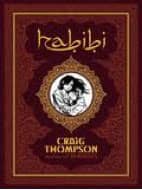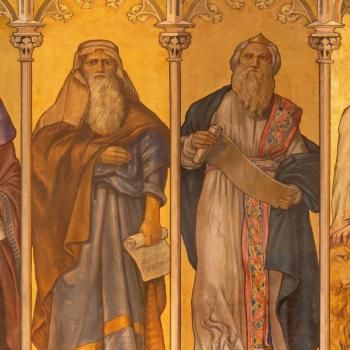 A comic book (and its longer cousin, the graphic novel) is made up of words and pictures. This might seem like an un-profound observation, but whenever the author of a comic book ventures into religious territory, the relationship between words and pictures becomes extremely tense. There are things the faithful only like to hear about through the abstraction of poetry. Take the now-infamous example of R. Crumb's illustrated Genesis, complete with war, gore, marital and extramarital sex, and various forms of violence—all taken straight from the Bible without elaboration.
A comic book (and its longer cousin, the graphic novel) is made up of words and pictures. This might seem like an un-profound observation, but whenever the author of a comic book ventures into religious territory, the relationship between words and pictures becomes extremely tense. There are things the faithful only like to hear about through the abstraction of poetry. Take the now-infamous example of R. Crumb's illustrated Genesis, complete with war, gore, marital and extramarital sex, and various forms of violence—all taken straight from the Bible without elaboration.
Some Christian observers were furious, which was of course the whole point. Critics of religion rarely miss a chance to be smug. In fact, the perennial question posed by atheists in such situations is, "Why get upset? It's your book."
The Bible has come under disproportionate fire when compared to the holy texts of other religions. And thus far, a strange and potent combination of liberal magnanimity and fear of reprisal has kept the Qur'an from getting the R. Crumb treatment at the hands of some intrepid artist.
It may also help—and non-Muslims will be surprised to hear this—that the Qur'anic version of the Old Testament stories is much more politically correct, and thus less interesting to those with a lurid imagination. The prophet Lot does not fornicate with his daughters, David does not send Bathsheba's husband out to die in a fit of lust, Solomon does not have nine hundred wives and concubines, and Eve does not conspire with Satan. Muslims are often surprised to hear that the Bible depicts holy figures carrying on in such an undignified fashion.
The Qur'an is in many ways far less concrete than the Bible, relying on the esoteric more often than the apparent.
It is this esoteric use of language to reveal hidden truths that has captured Craig Thompson's imagination in his long-awaited graphic novel, Habibi. An ambitious, surreal tale of the love between a young Arab girl sold into marriage and the orphan boy she adopts, Habibi spans multiple eras of conflict and change, stretching the lifetimes of its two protagonists over many centuries. The Qur'an is central to Thompson's narrative, though oddly enough the religion of Islam is not.
Instead of retreading the usual unpleasant arguments over Islamic law, Thompson ventures into the hinterland of mysticism, exploring the symbolic nature of Arabic letters and words and their implications. Thompson's deep artistic appreciation of the Arabic language is vividly apparent, as is the amount of research he must have done. Reading Habibi, I found myself wondering about the author's own spiritual journey. How did Thompson, raised a conservative Christian, come to be interested in the mysticism of the Qur'an? That's a book I'd read, if he were ever inclined to write it.
Despite the fact that it contains a slew of clichés with which the Muslim community (especially the female half) has become very weary—underage marriage, harems, eunuchs, slavery, veiling, the imaginative fodder of the right wing—Habibi does not read like a book with an agenda. The orientalist tropes Thompson employs feel self-conscious; he deftly drafts them into the service of his protagonists' emotional journeys as they are separated and reunited. This is not the usual titillating romp through the vices of a barbaric culture, after which the reader can close the book and thank God he lives in a civilized country.
Instead, the slave drivers and harem women feel like deliberate fictions, the purpose of which is to unpack universal human anxieties, primarily about the messy physicality of life and the permutations of love over time. It is not a comfortable read, but the discomfort stems from Thompson's profound emphasis on the life of the body—the way pain, mutilation, aging, sex and pregnancy affects not only how we feel, but who we are.
Innovative though Thompson's inversion of stereotypes may be, I found myself wishing he'd pushed himself a little more and taken us somewhere truly new. By the end of Habibi, the co-opting of clichés in the service of deep thought (black palace eunuch as meditation on body image and physical intimacy!) started to feel a little too artsy. And there were two points at which I thought Thompson, perhaps (blamelessly) by virtue of being male, simply misfired: One in which the main character dismisses her newborn infant in a way I, as a mother, found implausible, another in which the same character sheds her headscarf after catching her first glimpse of westernized women in a way I, as a muhajaba (one who wears the headscarf), found ridiculous. Nevertheless, the sheer dearth of sympathetic Muslim characters in western literature (and the fiercely secular world of comics and graphic novels in particular) makes me want to forgive a few small sins of inauthenticity.




